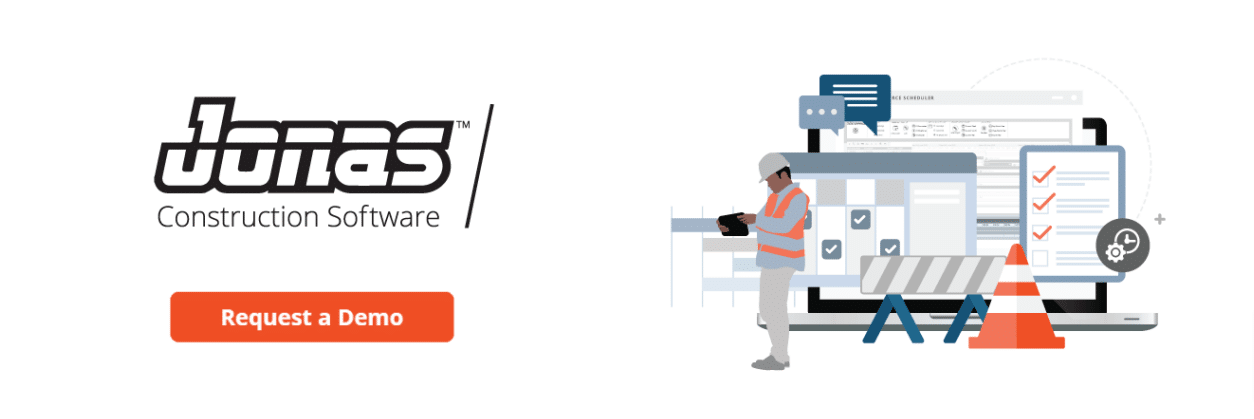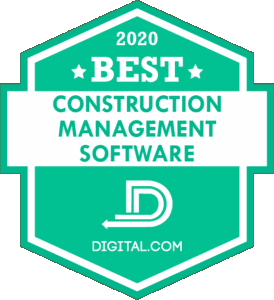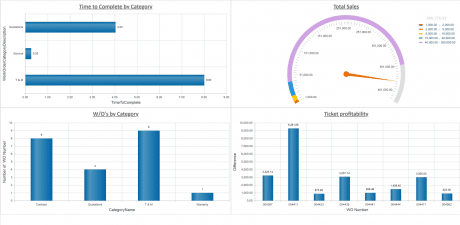Last Updated on July 4, 2024
Aug 12, 2020
Jonas Construction was thrilled to be invited as a guest on the ConTech Crew Podcast recently to discuss construction technology and cloud software with host and JBKnowledge CEO James Benham and BIMBOX’s Buck Davis. Representing for Jonas was our Director of Sales, Yana Tcharnaia.
A summary of their discussion on construction ERP and the future of ERP and cloud software is found below:
- Introduction
- Learning About Construction Technology and the Industry
- How ERP Addresses the Pain Points of Today’s Industry with Technology
- When to Move to a construction ERP System
- The Dangers of Not Reviewing Your Business Financials Regularly
- What Jonas Offers to MEPs (Mechanical, Electrical, Plumbing) and HVAC Contractors
- Jonas in the Cloud
- The Importance of BI and Analytics for and Why Integration with Your Construction Management Software is Critical
- Eliminating the Costs of Running Multiple Applications with ERP
Introduction
According to ConTech Crew host, James Benham, construction is the one of the world’s oldest industries but it spends the least amount of money on innovation. The ConTech Crew Podcast was conceptualized based on the fact that many people outside and inside the industry don’t typically associate technology like virtual reality apps and robotics with construction. Each week, the ConTech Crew brings listeners the latest in construction technology news and interview the minds behind the technological innovations, changing the way we build.
James and Yana first discuss how they learned about the construction technology industry and what they enjoyed about.
James learned about the construction industry through building software for contractors and speaking directly with estimators, project managers and bid clerks. From listening to their problems, he learned more about the industry and how to build technology that would help them solve their issues.
The best part about working in the construction industry for Yana is collaborating with some of the hardest working people she’s ever met; as well as the ability to help educate people about the latest technologies available to better support their businesses. With a combination of a strong work ethic and some of the coolest technology available, Yana believes the construction industry will be unstoppable in the future.
Next, they discuss ERP Software. James believes that ERP can be a difficult topic for some people to discuss because ERP projects can be complicated, and the software itself is justifiably expensive. James asks how ERP software is responding to modern pain points and technology.
Yana agrees with James’ point and says that most people will only switch to an ERP system when they are explicitly feeling the pain with their current systems and their processes are failing them.
For example, what usually happens is that contractors are finishing jobs and they don’t have any insight or visibility into the jobs. Will they be profitable when the job is completed? For many, once they’ve reached the end of the project, they’ve already lost a lot of money and don’t even realize it because their Accounting and Job Costing systems don’t work collectively together.
Other issues people encounter is that they don’t have the proper job cost reports or reports for the service side of their business. With work orders, many people are are still using manual processes and doing everything on pen and paper.
The list of pain points is endless: they forget to bill for materials, hours worked, they forget to bill a client, their technicians are writing down incorrect information and their service manager wasn’t including information in their accounting system, etc.
So while most people are resistant to switching to an ERP system, it eventually comes to a point where they take on more jobs, the company is growing, and they want to increase their profit margins.
James states that ERP is a foundational software, which is why it takes a while to implement and can be highly priced. And because of this, if a company is investing into ERP, the system should truly scale with their business. James uses the example of QuickBooks because many construction businesses still run solely on it, and asks at what point do people who run on software like QuickBooks realize they need more for their business?
Based on market research, Yana says that approximately 55% of construction companies still use QuickBooks, there are even companies who are earning as much as $30 million in revenue that are still on QuickBooks. In her opinion, these companies are surviving and not thriving without the full visibility on their jobs. For example, she spoke with a business the previous week who said they didn’t know if they were going to make money or lose money until the job was completed. And most of the time, they found they were either losing money or breaking even. The main issue is that many businesses like this one don’t have a proper construction management system, which lets them see their committed costs or costs to-date. When businesses get to the point where they are continually losing money or breaking even on jobs and need to increase their profit margins, that’s when they consider moving to a construction ERP system. For more on the subject, check out our blog article on When it’s time to switch to an ERP solution.
On the topic of visibility into business operations and financials, Buck shares his personal experience of working with a company that would send him a summary of invoices for the previous six months.
This was alarming to see as it meant that the business hadn’t reviewed their expenses for six months, which unfortunately, is a reality for many businesses. And if you’re not frequently reviewing your business expenses, your business is destined to fail.
Buck inquires about what Jonas offers to MEP (mechanical, electrical, plumbing) contractors who provide a number of services to clients.
Yana advises that Jonas has two software packages: Jonas Premier and Jonas Enterprise. Jonas Enterprise is designed for specialty contractors like Mechanical, HVAC, Plumbing, and Electrical contractors, while Jonas Premier targets general contractors, land developers, design build construction managers, and homebuilders.
A big differentiator for Jonas is that they handle both sides of the construction business and because of the specific niches it caters to, Jonas doesn’t have many competitors in the space that can target companies that handle both construction and service.
While some companies were previously looking to survive with software like QuickBooks, they’re now looking at software that can handle both sides of their business because both are equally important. On the service side, they have some income that is recession proof and with construction, they can focus on growth because that’s where the big money is for them.
With Jonas, businesses can manage both sides of the business really well – between construction management, work order management, dispatching, maintenance contracts, as well as on the job costing side – construction, project management functionality including Change order Management, RFIs, and Submittals – Jonas can do it all.
James reiterates Yana’s point about service being a recession proof source of income and references when 9-11 happened, service helped the economy survive and the same with COVID-19. Service helped economies persist because of the fact that people couldn’t afford a replacement budget and had to rely on spending more on service. There are still many construction management and ERP softwares that don’t handle service appropriately, much less the construction side.
James inquires about Jonas’ use of cloud software in the construction space.
Yana states that Jonas was actually one of the first companies in the construction space to build a cloud-based, construction ERP software. Approximately 60% of the clients or companies that Jonas speaks to are open to cloud, while the other 40% don’t have that level of comfort or trust yet. This was why both Jonas Premier and Enterprise partnered with Microsoft Azure to run both platforms on Azure. Jonas understands that when it comes to software, people want something that is flexible, powerful and user-friendly.
The future of the industry is in the cloud and Jonas Enterprise and Premier will continue to develop new software and modules to specifically target towards its niche markets. There are still many construction ERPs out there that target the overall industry, not realizing that specialty contractors just aren’t looking for the same things as general contractors and vice versa.
Want to be cloud ready? Check out Jonas Cloud.
The topic of big data was brought up by Buck and he inquires about Jonas’ integration with BI (business intelligence) and data analytics.
Yana explains that Jonas researched a few different systems for BI and data analytics before building its own system called Enterprise Business Intelligence (EBI). One of the biggest differentiators for Jonas is that they build their own systems to allow for true integration with other modules. With Jonas’ EBI, every module and field in Jonas can be reported on and there is also a great dashboard feature included. It is a hybrid module, which means that it works on both your computer and mobile device and is entirely web based.
For example, if you want to view profitability based on your technicians, you can easily view that information on a mobile device, you can also pull up the document and drill down into the numbers. You can do the same with viewing outstanding invoices and aged receivables and drill down to the point where you see the actual invoices. So that’s really just an example of what the power of an integrated solution can do for your business.
James and Buck both agree that they love the data and analytics that BI provides. It’s a key indicator for productivity measurement and analysis, which is why many businesses want it. There’s also very a good argument for having BI integrated in your construction management and ERP system.
Firstly, there are some licensing challenges when you’re embedding another product into your software and there may also be business structural issues. Secondly, you can’t customize it the way you want it to be.
James and Buck move to the latest in construction and technology news for that week and discuss the options of building custom software and how people overlook the expenses of maintaining that software once it’s built.
James gives the example that it’s like building a building, once you build it and live in it, you have to continue investing into it. “What you spend on maintenance on a custom app is the same or higher than what you spent on building it.”
Buck cites a news article that states that companies are running as much as 88 applications on average for their business, so people have to be mindful of all the costs of running multiple subscriptions.
Yana agrees and says that Jonas encounters many businesses that own multiple software packages, but their staff is reluctant to use it and stay on their Excel spreadsheets. No one likes change, but once they see how much time their manual processes are taking them, they know they need to automate them with the proper software. Once they switch to an ERP system, they can narrow down the list of 80 plus software packages they were paying for to maybe 10 solutions.
The conversation with the ConTech crew closes with James thanking Yana for her time and insight on ERP software and the future of the construction industry.







